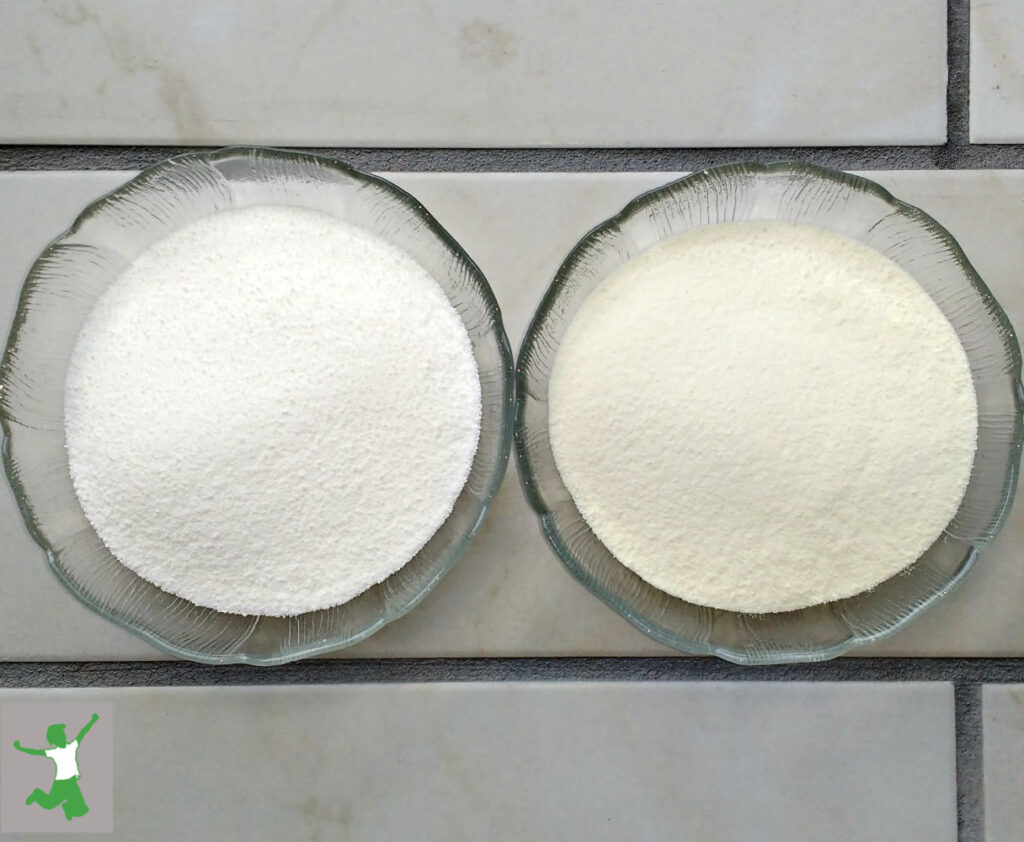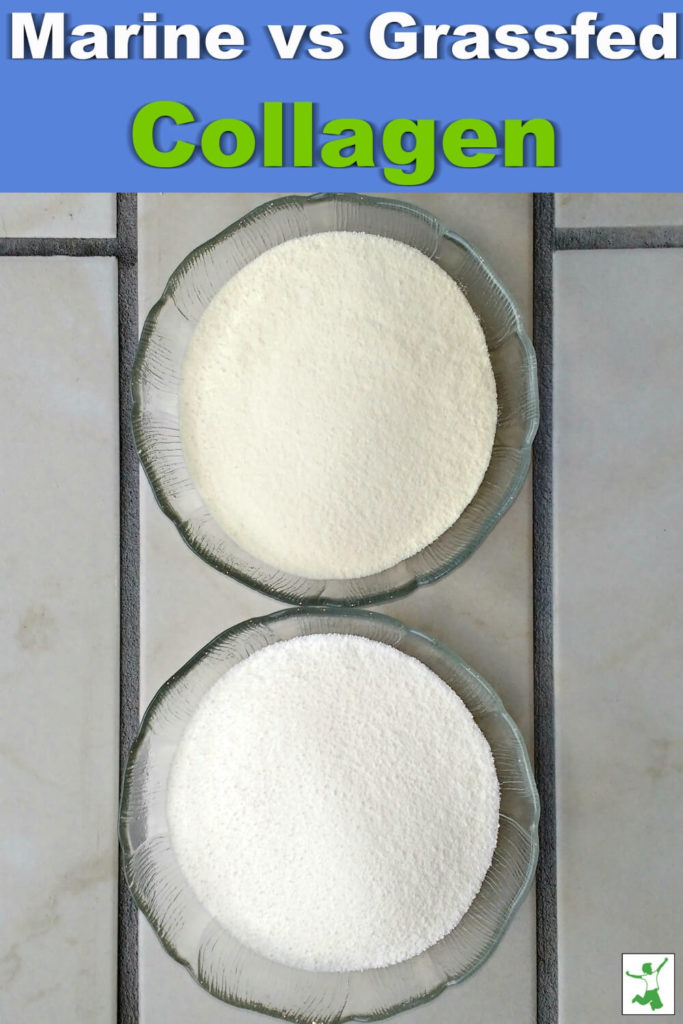
There seems to be a lot of confusion surrounding the topic of hydrolyzed collagen, commonly called collagen hydrolysate.
This is especially true with regard to how it compares with a closely related food known as gelatin.
For example, I’ve had an increasing number of emails from people who have attempted to make homemade jello, mousse or similar recipes and inadvertently used hydrolyzed collagen instead of gelatin.
As a result, the recipe ended up being a total fail because hydrolyzed collagen does not congeal liquids at all. This compares with a single tablespoon of gelatin which is enough to firmly set 2 cups of liquid.
This mistake is very easy to make because gelatin and hydrolyzed collagen look and taste almost exactly the same. This is due to a very similar amino acid profile.
Part of the confusion is a simple case of semantics. Let’s clear that up first.
The Many Names for Hydrolyzed Collagen
The names used to refer to hydrolyzed collagen are many.
So that you don’t ever confuse it with its similar cousin, gelatin (aka collagen protein), and mess up a recipe (real food ingredients are expensive!), be sure to make a mental note of these commonly used aliases:
Common Aliases
- Collagen hydrolysate
- Hydrolyzed gelatin
- Hydrolyzed gelatine (the UK and Australia)
- Hydrolyzed gelatin(e) collagen
- Collagen peptides
- Peptides
- Hydrolyzed Collagen Protein
- Hydrolyzed Collagen Peptides
Have you come across other nicknames for hydrolyzed collagen? If so, please let us know in the comments section.
What is Hydrolyzed Collagen?
The benefits of gelatin as a traditional food are many. To start with, it has powerful anti-inflammatory and anti-aging qualities (suggested sources).
It does an amazing job of helping to fill in the missing amino acids (the building blocks of proteins) in the diet.
This is especially important if you don’t include much (or any) meat stock (bone broth has little collagen) in your diet, are vegetarian, or have a lifestyle which makes it difficult to eat a balanced, ancestral diet that makes a point of prioritizing “nose to tail” eating (using the whole animal for food and not just the muscle meat) like traditional cultures frugally practiced out of necessity.
Gelatin has a unique amino acid profile, primarily consisting of glycine, glutamic acid, proline, and alanine.
It is derived from the connective tissues of animals, either cattle, pigs or fish. In bovine gelatin, the collagen comes from the tissue just underneath the hair found on the hide of the animal.
Although the amino acids in gelatin are non-essential (meaning your body is able to make them), many nutritionally deficient and overly stressed people are not able to manufacture them in the amounts demanded by the body for optimal health.
The liver needs an abundance of these amino acids to keep functioning at a high level, particularly to fuel detoxification which has the benefit of reducing inflammation.
As a food, hydrolyzed collagen is very similar to gelatin, but there are critical differences.
This is because the manufacturing of hydrolyzed collagen is more intensive than the processing of gelatin. Hydrolyzed collagen manufacturing breaks up the amino acid chains (protein) into smaller units than the processing of gelatin.
Thus, while the amino acid profiles and health benefits between hydrolyzed collagen and gelatin are similar, the chemical properties such as the ability to set liquid, are quite different.
In addition, the digestibility of hydrolyzed collagen appears to be superior for some people due to the less complex structure.
Research Studies on Health Benefits
Consumer interest in hydrolyzed collagen has exploded in recent years due to a growing body of research that suggests it has powerful anti-aging properties for skin, bone, and joints.
It is well known that collagen is an important building block for the body’s connective tissues, helping them maintain strength and elasticity. (1)
The Journal of Agriculture and Food Chemistry built upon this foundational research showing that when a person orally consumes collagen hydrolysates, blood levels of the peptide form significantly increased and reached maximum levels after 1-2 hours.
After that, blood levels decreased to half of the maximum level 4 hours after ingestion. (2)
Does this increase in blood levels of collagen peptides actually benefit connective tissues, however? Again, research suggests this is so.
The Journal of Nutritional Science and Vitaminology published a study where researchers demonstrated that the ingestion of collagen peptides beneficially affects the size and composition of collagen fibrils in the Achilles tendon thus potentially improving its mechanical properties. (3)
What about bone health? Animal studies on collagen peptides suggest that oral consumption of hydrolyzed collagen may benefit bone health in both males and females even in a calcium-deficient state. (4)
Another clinical study published in the periodical Seminars in Arthritis and Rheumatism examined the ingestion of 10 grams of collagen peptides per day for a period of 30-90 days. A positive effect on knee joint comfort was noted and the effect was even more pronounced in patients suffering more severe symptoms. (5)
The most compelling research of all?
The journal Skin Pharmacology and Physiology published a “gold standard”, double-blind, placebo-controlled study in 2014 which demonstrated a causal relationship between a 12-week daily regimen of orally consumed hydrolyzed collagen and significantly improved skin elasticity, structure, and moisture. (6)
This study gives concrete evidence as to the likely reason why ancestral peoples maintained such a youthful countenance into middle and old age.
It wasn’t just less stress and lots of fat-soluble vitamins (especially vitamin K2) although this certainly helped.
Youthfulness in old age was also at least partially due to the collagen in their diet from the traditional practice of nose-to-tail eating.
This has been de-prioritized in the modern diet as the popularity of processed foods and a disposable, throw-away mentality steadily advanced since World War II.
Which Type is Best?
There are two different types of hydrolyzed collagen currently on the market.
One type is derived from pasture-raised beef and the other from sustainable, wild-caught marine sources.
I have tried both types and can honestly say that I have a hard time telling the difference between them except for the slightly off white color of the pasture-raised peptides, which you can see in the picture above.
Tested for Purity
I’m going to give you a critical piece of advice when buying grassfed peptides.
Do not buy ANY brand unless it is tested for purity and glyphosate residue.
I have personal knowledge of some collagen brands testing very high in glyphosate. Thus, making sure the one you use is certified pure is very important.
Please note that the brands I suggest are tested to ensure no toxic residues are present!
How to Choose & Use Peptides
Both marine collagen and pasture-raised collagen peptides blend nicely in hot or cold foods like a smoothie, have a similar nutritional profile and digest very well.
It is very important to ONLY buy from brands that have independently tested and verified that their grass-fed collagen is free of glyphosate residue, a huge problem for these types of products that concentrate animal tissue.
This brand and this brand of organic grassfed collagen are both third-party certified by The Detox Project to be residue-free. (7)
Beware as most collagen brands are NOT verified to be clean!
If you are vegetarian, there are other options such as this marine sourced collagen peptide from wild fish.
Contraindications
As with anything, remember not to get too carried away with hydrolyzed collagen if you choose to use it in your diet.
It’s not a silver bullet for everything that ails you!
Go slow as adding too much too quickly can cause digestive issues like bloating or indigestion.
Collagen also is not a substitute in the diet for complete proteins found ONLY in animal foods (no single plant protein is complete from the perspective that it contains all the essential amino acids in the correct amount to support human health).
If you’ve already tried hydrolyzed collagen, which type do you prefer, pasture-raised or marine? Can you tell a difference and how do you use it?
(1) Oral intake of collagen peptide NS improves hydration, elasticity, desquamation, and wrinkling in human skin: a randomized, double-blinded, placebo-controlled study
(2) Identification of food-derived collagen peptides in human blood after oral ingestion of gelatin hydrolysates
(3) Effects of ingestion of collagen peptide on collagen fibrils and glycosaminoglycans in Achilles tendon
(4) The effect of food matrix on carbohydrate utilization during moderate exercise
(5) Role of collagen hydrolysate in bone and joint disease
(6) Oral supplementation of specific collagen peptides has beneficial effects on human skin physiology: a double-blind, placebo-controlled study
(7) Glyphosate-free collagen brands








Hi Holly,
I actually have question. Is it better to consume collagen peptides in powder form or in capsules or are they both equal in effectiveness? Thanks!
It doesn’t matter IMO.
Hello,
I was just wondering if there are any types of collagen or bone broth supplements that are not “hydrolyized”? Just a thought, as I’ve heard some people as stated above, are sensitive to the whole glutamate aspect? Thanks!
You can drink real homemade bone broth! The collagen in a cup of bone broth is not hydrolyzed. https://www.thehealthyhomeeconomist.com/video-traditional-stocks-and-soups/
I have been using beef based collagen for about 2 or 3 years with no adverse affects.
then i switched to a Marine based one in Oct last year,.
Recently read some current research in relation to the adverse effects of marine based collagen on auto immune diseases – causing adverse increase in inflammation. As i have Rheumatoid arthritis i quickly stopped taking the marine collagen as my joints have been in flare up mode since November which is unusual for me as my diet is Extremely good and i take a wide range of anti inflammatory natural supplements.
Would welcome folks views on the different affects re marine and animal based collagen supplements.
I think people that are sensitive to MSG should stay away from it. I react to collagen.
Is hydrolized collagen an excitotoxin
I don’t get it. Beef and marine collagen is supposed to be for skin, hair and nails. While chicken collagen and chicken bone broth is supposed to be for joints. Is beef and marine good for joints or not?
All types of collagen work very well for joints.
Thank you, Jojuan Cedergreen.
I’m not sure why there have been no replies to your very well-written account. I’m not well informed regarding hydrolized collagen, but will conduct serious research before deciding whether to use hydrolized collegen or gelatin. If your hypothesis/claim regarding the “Free glutamate” is accurate that’s a BIG DEAL.
I’m all over the newest one on the market!! Naturally sourced with HA naturally included in the matrix. Its Incomparable.
What’s your thoughts on the brand Bulletproof Hydrolyzed Collagen
What do you know about ‘golden greens’ collagen complex 5000mg hydrolysed collagen, I’m about to put it in the bin looks like a mud drink !
I would recommend skipping collagen fortified with greens. Powderized greens go rancid very easily. NOT a superfood!